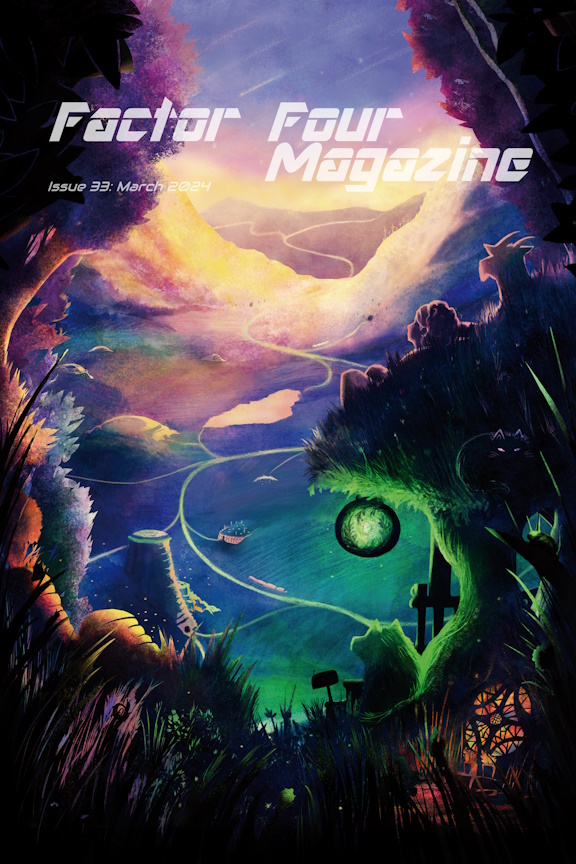Two Men on a Dirt Road Who Understood the World by Daniel Roop

He drove up from the city in July of ‘67, to teach me how to turn words into money, to speak magic to bend people to my will. His red Chevrolet gleamed like Eve’s apple as he eased into the gravel lot at Pearl’s. I sat at a splintery picnic table, heat hazing down in waves though it wasn’t yet noon. I stood as he approached, and offered my hand, remembering the importance of a tight grip. “Sam?” he said. “Carl Sanders—Sanders, like the chicken guy—you’ll never forget that, now, will you?” He had the straightest, whitest teeth I’d ever seen, shining like a bright future, or an unsheathed weapon. “Let’s talk on the way,” he said, hand on my sweaty elbow, maneuvering me where he wanted me to go.
Sanders was the best Kirby salesman in East Tennessee, and it was my good fortune the company had sent him to the backwoods of Scruggs County to train me. I’m sure he wasn’t thrilled, but that smile didn’t waver, even as dust from the dirt roads coated his whitewalls. “What brings you into the business, Sam?”
I told him I worked in the zinc mines, but my nine-year-old daughter was special, and we needed money for her future. Bet was way ahead of the kids at Scruggs Elementary. I thought she could be just about anything, even a nurse or a teacher, but that meant college.
“Awful ambitious for a little girl. Can’t put too much on her, now. What does she want?”
“Well, she don’t want to be neither one. She wants to start her own business.” We both chuckled and shook our heads, two men on a dirt road who understood the world, who knew there were limits.
“Where to first?”
He flipped open a folder. “Tobiatha Holt, Frog Catch Lane.”
I’d lived in Scruggs my whole life, and knew there was no such road. Some names changed over the years as families spread out, but no Frog Catch Lane. Still, I wasn’t going to correct him. He’d realize when we got there.
But sure enough, when we reached the towering sycamore mentioned in the file, a rutted, overgrown turn-off appeared with a weathered gray post, a primitive frog carved into the wood. Carl said, “Just stay quiet and smile. I’ll show you my best technique. Never fails.” He checked his teeth in the rearview mirror and parked in the yard.
We wended through knee-high grass, me lugging the vacuum. The farmhouse was ancient, paint peeling off in plate-sized flakes. Carl knocked, and the door opened on a stooped, owlish woman in a threadbare housecoat and slippers. She peered over grease-smeared glasses, stringy gray hair curtaining her face. Carl wedged past her, talking the whole time, pleasure to meet you, ma’am, stacking up empty pleasantries, leading her into her own house. I followed.
Carl stood in the dark living room, lit weakly by sun peaking through grimy windowpanes. From his sportscoat pocket, he pulled out a pint jar of dirt. He ceremoniously unscrewed the lid and dumped the dirt right in the middle of her floor. He motioned for me to bring the Kirby and said, “Now ma’am, I’ll show you how to make your problems disappear. Where’s your outlet?”
I didn’t know sales, but I knew her answer.
“What outlet?”
Carl’s smile finally faltered. He turned to me as though it was my fault, muttered, “Guess you’re gonna clean up this dirt.”
Tobiatha said, “What dirt?”
We scanned the floor, and the pile was gone. She hadn’t moved.
Carl clutched the empty jar, grappled for answers. “Ma’am, I know I’m not crazy, but I swear, by my right hand—”
“What hand?”
A gold wedding band clinked on the floor. Carl crumpled to his knees, grasping the newly-smooth stump at the end of his wrist. “Oh, god! It hurts—”
“What hurt?”
His screams stopped, and he rose slowly, but his stump, and our panic, remained. Our understandable world was gone. We stared into darkness. Carl and Tobiatha spoke. I listened.
“Ma’am, whatever this is, please, we’ll just be going. I’ll never set foot—”
“What foot?”
Carl collapsed to the floor again, imbalanced on his rounded ankles. He drug himself along the stained hardwood, howled, “Sam, get the door!”
“What door?”
The wall was solid, the exit gone.
He mewled, “Please, we’ll never tell, I’ll keep it secret—”
“What secret?”
Gray wisps poured out of Carl’s nose and mouth, taking shape, Carl with different women, Carl striking a small boy’s face, Carl forging a forgetful old man’s signature. Carl, pitiful, unimaginative, revealed.
Over the next hour, her words disappeared him piece by piece, until the small fragment left on the carpet said, “I can’t catch my breath—”
“What breath?”
Carl gone, she turned to me.
I begged, “Please, I have a daughter.”
“What—”
My joints turned to water, and I fell to my knees. This was too much—
“—an undeserved blessing. Tell me about her.”
I told her about Bet, my dreams for her, but Tobiatha saw deeper, and asked about Bet’s dreams. She produced some parchment and a green fountain pen, wrote something, sealed it in an envelope, and said, “This is for Bet alone.”
I took it and backpedaled out the door, stammering, “Thank you, ma’am, I’ll never tell anyone about this place—”
“What place?”
I stood in the empty field and began the long walk home. I gave the envelope to Bet that night without a word, scared to do so, but more scared to disobey. I stayed in the mines. Often, I woke at midnight, grasping for my own hands. Behind Bet’s door, I’d hear pages turning.
Twenty years removed from revelation, I stood behind Bet in Nashville at the ribbon cutting for her firm. She gave me the tour of her office. A framed piece of yellowed parchment hung over her desk, which I’d never read, which she’d never forgotten, which said, “What limits?”





